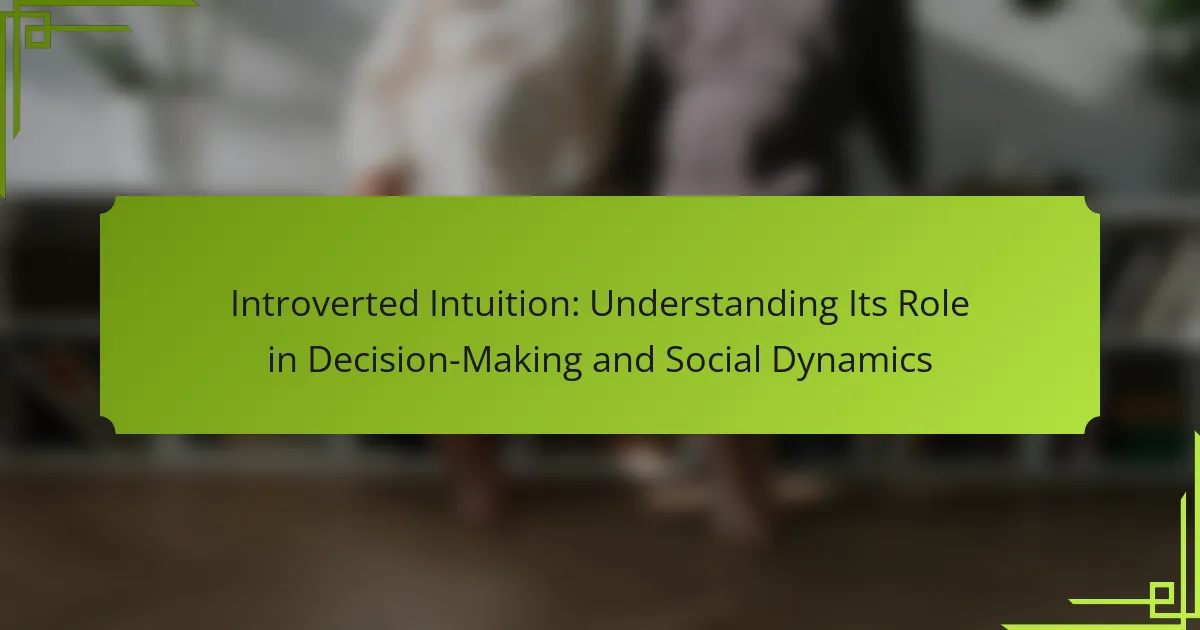Understanding how Introverted Intuition influences decision-making and social dynamics can enhance personal insight and strategic thinking. This cognitive function guides individuals in synthesizing complex information and recognizing patterns. It fosters deeper connections by anticipating others’ motivations. Engaging with this function can lead to innovative insights and meaningful interactions.
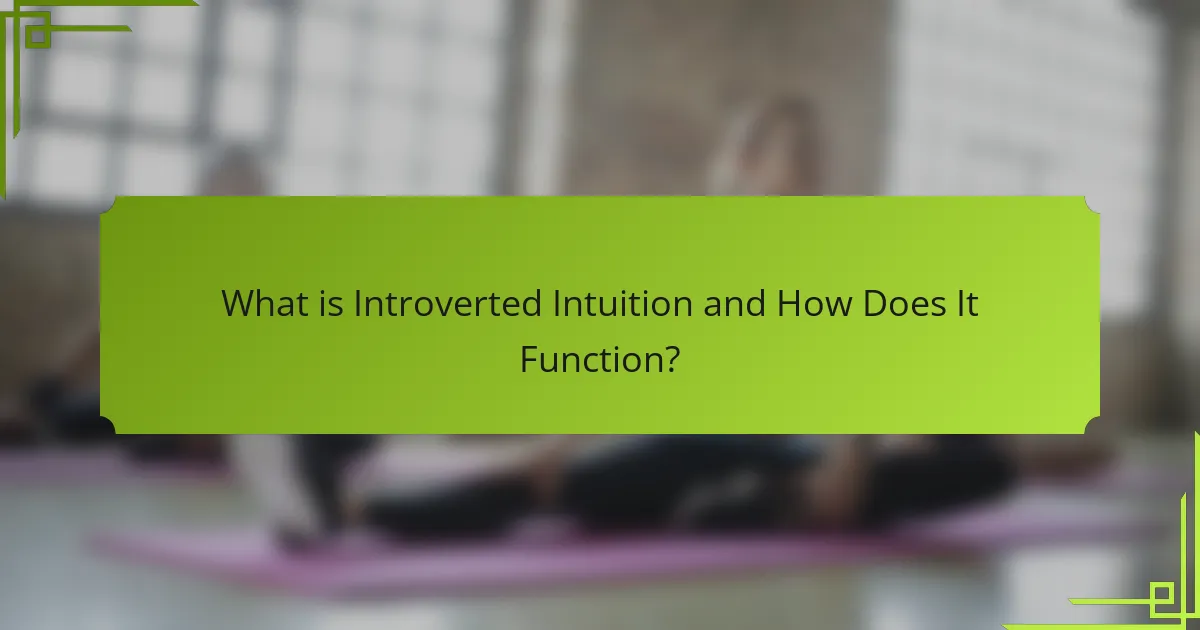
What is Introverted Intuition and How Does It Function?
Introverted intuition is a cognitive function that enables individuals to process complex information and foresee potential outcomes. It plays a crucial role in decision-making by allowing users to synthesize abstract ideas and patterns. This function often manifests in social dynamics through an intuitive understanding of others’ motivations and feelings. Introverted intuition is characterized by its unique ability to connect disparate concepts, leading to innovative insights and foresight.
What are the key characteristics of Introverted Intuition?
Introverted Intuition is characterized by deep insight, future-oriented thinking, and an ability to synthesize complex information. It often manifests as a strong internal vision, guiding decision-making through patterns and possibilities. Individuals with this trait tend to focus on abstract concepts rather than concrete details, allowing them to foresee potential outcomes. This cognitive style is valuable in social dynamics, as it fosters understanding of underlying motivations and connections among people.
How does Introverted Intuition differ from other cognitive functions?
Introverted Intuition primarily focuses on internal insights and future possibilities, differing from other cognitive functions. Unlike Extraverted Intuition, which emphasizes external patterns and possibilities, Introverted Intuition relies on deep, personal understanding and foresight. This function processes information in a holistic manner, integrating past experiences and future implications, making it unique in its approach to decision-making and social dynamics. Additionally, it contrasts with Introverted Sensing, which is grounded in concrete experiences rather than abstract insights. This distinct perspective enables individuals with strong Introverted Intuition to navigate complex social situations with an intuitive grasp of underlying motivations and future outcomes.
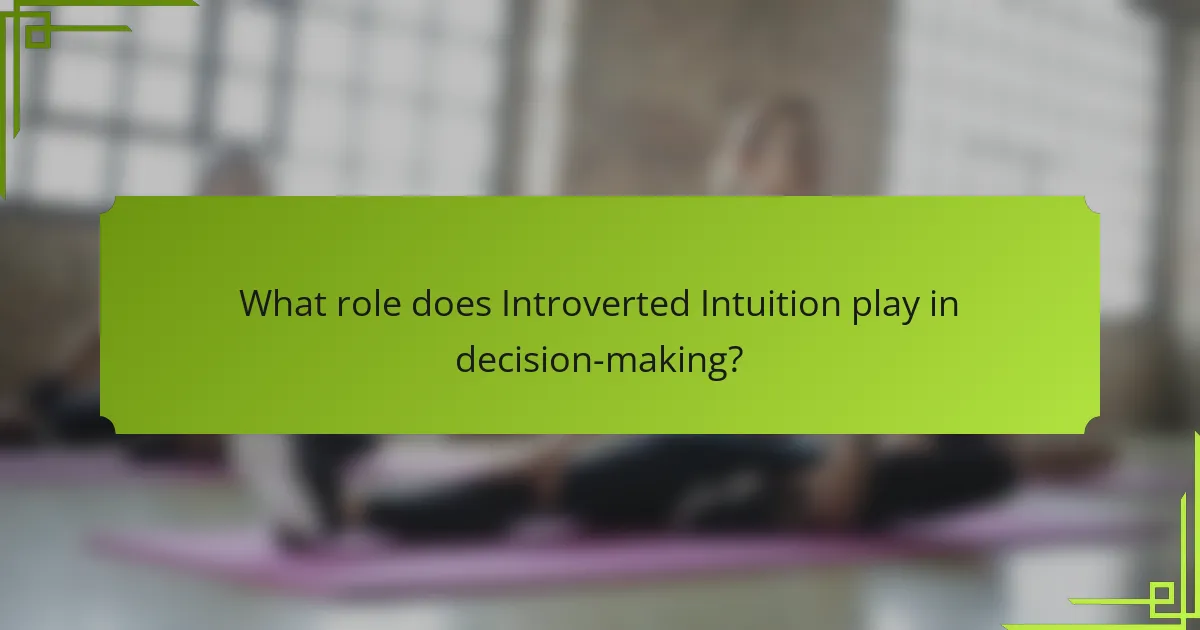
What role does Introverted Intuition play in decision-making?
Introverted Intuition plays a crucial role in decision-making by guiding individuals toward abstract insights and future possibilities. This cognitive function enables deeper understanding of complex situations, allowing for intuitive leaps that inform choices. Users often rely on their gut feelings, synthesizing information from various sources to foresee potential outcomes. As a result, decisions made through Introverted Intuition tend to reflect a long-term vision rather than immediate gratification. This unique attribute fosters creativity and strategic thinking, essential for navigating social dynamics effectively.
How does Introverted Intuition influence risk assessment?
Introverted Intuition enhances risk assessment by providing deep insights and foresight. Individuals with this cognitive function often analyze patterns and future implications, allowing for more informed decision-making. They excel at predicting potential outcomes based on past experiences and internal reflections. This unique attribute enables them to identify risks that others may overlook, leading to more strategic choices. As a result, their approach to risk is often more nuanced and comprehensive, balancing intuition with analytical thinking.
What are the cognitive processes involved in decision-making through Introverted Intuition?
Introverted Intuition involves complex cognitive processes that influence decision-making by synthesizing internal insights and external patterns. This cognitive function enables individuals to foresee potential outcomes and make informed choices based on deep-seated understanding.
Key processes include pattern recognition, where the mind identifies connections between seemingly unrelated information, and foresight, allowing individuals to anticipate future scenarios. Additionally, it engages in reflective thinking, where past experiences inform present decisions, enhancing the depth of understanding.
The unique attribute of Introverted Intuition is its ability to operate independently of immediate sensory data, relying instead on abstract concepts and underlying meanings. This results in a holistic approach to decision-making, often leading to innovative solutions that others may overlook.
As a result, individuals utilizing Introverted Intuition can navigate social dynamics effectively, as they perceive nuances in interpersonal interactions and adapt their decisions accordingly. This cognitive process not only shapes personal choices but also influences group dynamics by fostering a deeper understanding of collective motivations.
What steps are involved in the decision-making process?
The decision-making process involves several key steps that utilize introverted intuition. First, identify the problem or decision at hand. Next, gather relevant information and insights. Then, analyze the data and consider various perspectives. Afterward, synthesize the information to develop potential solutions. Finally, make a choice and evaluate the outcome to inform future decisions.
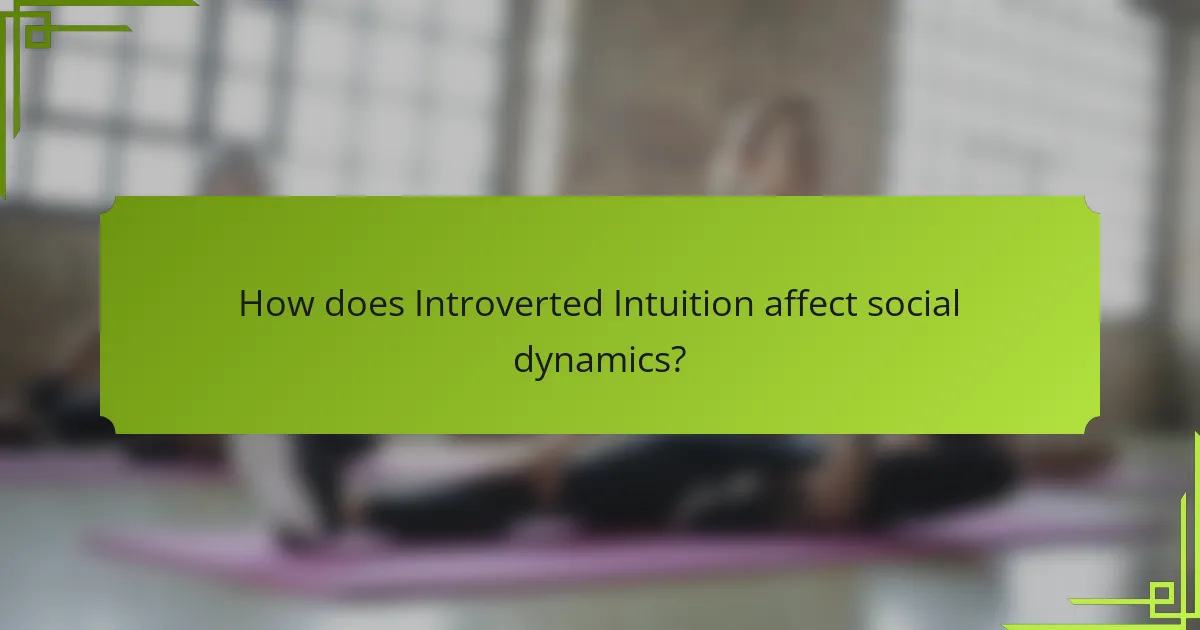
How does Introverted Intuition affect social dynamics?
Introverted Intuition significantly shapes social dynamics by fostering deep understanding and strategic foresight. Individuals with this cognitive function often perceive underlying patterns in social interactions, enabling them to navigate complex relationships effectively. As a result, they can anticipate others’ motivations and reactions, enhancing their ability to connect meaningfully. This unique attribute allows them to influence group dynamics subtly, often serving as insightful advisors or mediators in social settings. Their introspective nature may lead to a preference for meaningful conversations over superficial exchanges, which can deepen social bonds.
What impact does Introverted Intuition have on interpersonal relationships?
Introverted Intuition significantly influences interpersonal relationships by fostering deep understanding and empathy. Individuals with this intuition type often perceive underlying meanings and patterns in social interactions, enhancing their ability to connect with others. They may excel in recognizing unspoken emotions, which can lead to stronger bonds. However, their introspective nature might also result in challenges, such as difficulty expressing feelings or a tendency to withdraw in social settings. Balancing these attributes can lead to healthier relationships and improved communication dynamics.
How can Introverted Intuition enhance social understanding?
Introverted Intuition enhances social understanding by promoting deep insights into others’ motivations and emotions. This cognitive function allows individuals to perceive underlying patterns in social interactions. As a result, they can navigate complex social dynamics with greater ease. Introverted Intuition also fosters empathy, enabling individuals to connect with others on a more profound level. This ability to intuitively grasp social cues often leads to more meaningful relationships and effective communication.
What are the common social challenges faced by individuals with strong Introverted Intuition?
Individuals with strong Introverted Intuition often face social challenges such as difficulty in expressing thoughts, feeling misunderstood, and experiencing social fatigue. They may struggle with small talk, preferring deep conversations, which can lead to isolation. Additionally, their tendency to focus on abstract concepts may create barriers in connecting with more pragmatic individuals. This unique attribute of seeking depth can result in frustration when interactions lack substance. As a result, they may find it challenging to navigate social dynamics effectively.
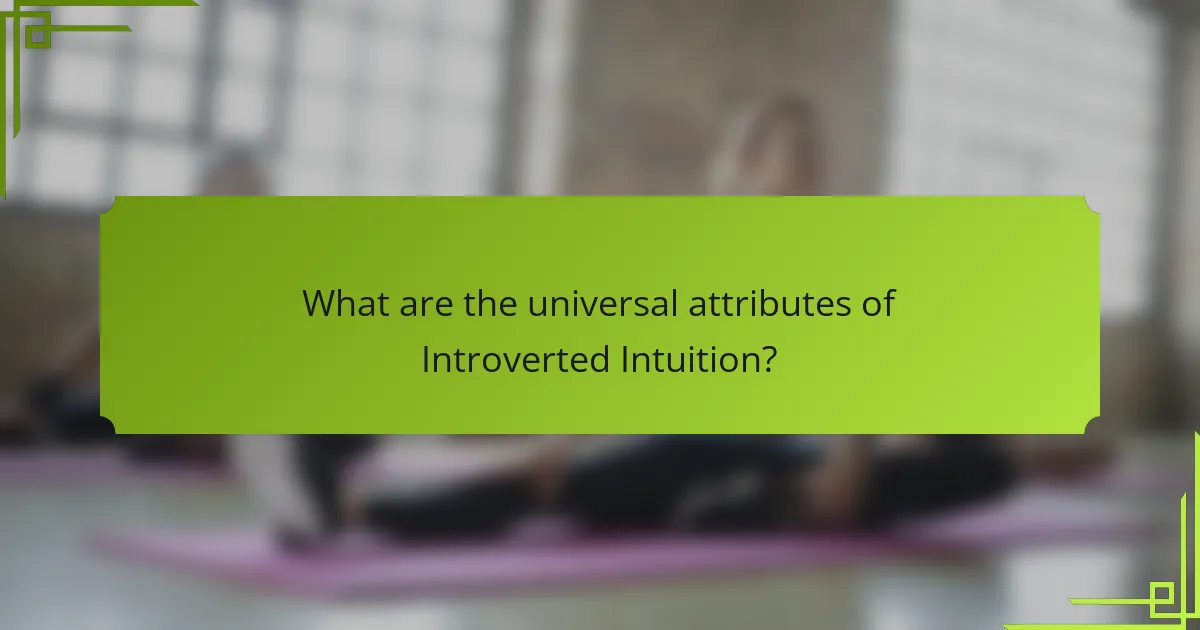
What are the universal attributes of Introverted Intuition?
Introverted Intuition is characterized by its focus on internal insights and future possibilities. Key attributes include depth of understanding, pattern recognition, and holistic thinking. It often manifests in visionary ideas and an ability to foresee outcomes, influencing decision-making and interpersonal dynamics. This cognitive function values abstract concepts and synthesizes information, leading to unique perspectives.
How is pattern recognition a fundamental aspect of Introverted Intuition?
Pattern recognition is essential to Introverted Intuition as it enables individuals to identify underlying patterns and connections in complex information. This cognitive function allows for synthesizing disparate data points, leading to insights that inform decision-making. Introverted Intuition relies on recognizing subtle cues and trends, enhancing social dynamics by anticipating others’ needs and motivations. This unique ability fosters a deeper understanding of situations, making it a critical asset in both personal and professional contexts.
What role does foresight play in Introverted Intuition?
Foresight significantly enhances Introverted Intuition by enabling individuals to anticipate future outcomes. This intuitive process allows for deep reflection and pattern recognition, leading to informed decision-making. Those with strong Introverted Intuition often visualize potential scenarios, which aids in navigating social dynamics effectively. This unique attribute fosters a strategic approach, allowing for proactive rather than reactive responses in various situations.

What are the unique attributes of Introverted Intuition?
Introverted Intuition exhibits unique attributes that influence decision-making and social dynamics. It emphasizes foresight, pattern recognition, and deep internal processing. This cognitive function allows individuals to synthesize complex information and foresee potential outcomes, often leading to insightful conclusions. It operates in a reflective manner, prioritizing personal insights over external validation. Additionally, it fosters a unique perspective on reality, enabling users to navigate social situations with an intuitive understanding of underlying motives.
How does creativity manifest through Introverted Intuition?
Creativity manifests through Introverted Intuition as an internal process that synthesizes abstract ideas and insights. This cognitive function allows individuals to perceive patterns and connections, leading to innovative solutions. Introverted Intuition often results in unique perspectives that can enhance decision-making and social dynamics. By tapping into their subconscious, individuals can generate original concepts that may not be immediately apparent to others.
What distinguishes the insights gained from Introverted Intuition?
Insights gained from Introverted Intuition are distinguished by their depth and foresight. This cognitive function enables individuals to perceive underlying patterns and connections in complex situations, enhancing decision-making. Unique insights often emerge from a reflective process, allowing for innovative solutions. The ability to synthesize information from diverse sources contributes to a nuanced understanding of social dynamics.
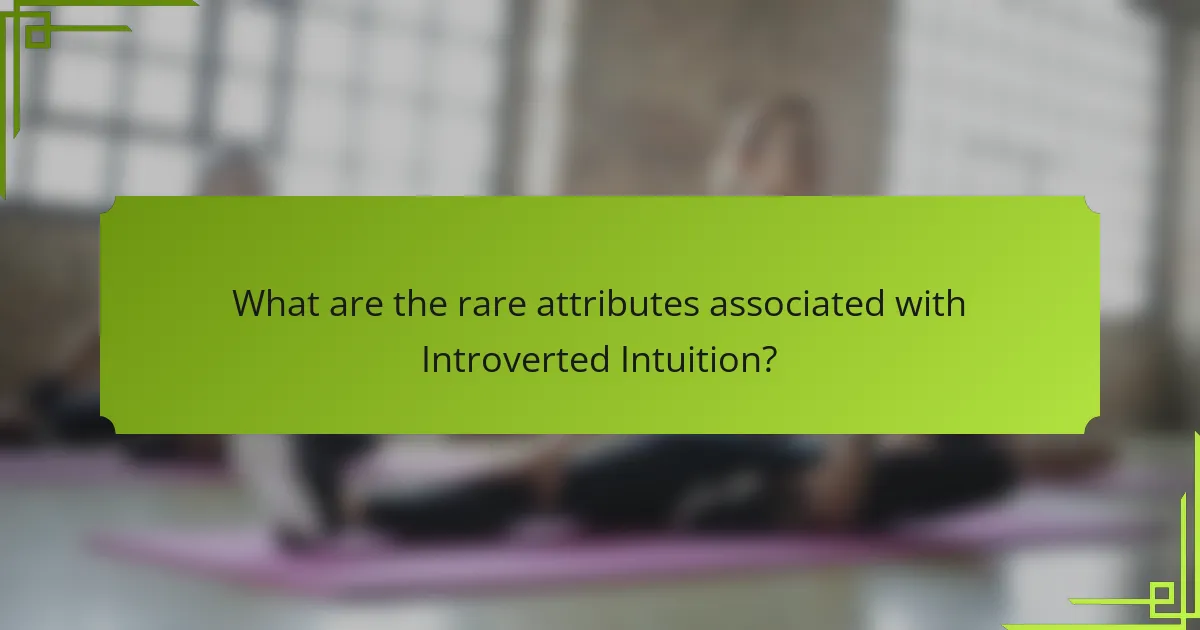
What are the rare attributes associated with Introverted Intuition?
Introverted Intuition is characterized by rare attributes such as deep foresight, abstract thinking, and complex pattern recognition. These attributes allow individuals to perceive underlying meanings and connections that others may overlook. Additionally, they often exhibit a tendency for introspective contemplation, enabling unique insights into future possibilities.
How does Introverted Intuition relate to visionary thinking?
Introverted Intuition fosters visionary thinking by enabling individuals to perceive abstract connections and future possibilities. This cognitive function allows for deep insights beyond immediate experiences, driving innovative ideas. It emphasizes pattern recognition, which is crucial for strategic decision-making and long-term planning. As a result, those with strong Introverted Intuition often excel in roles requiring foresight and creativity.
What are the infrequent challenges faced by individuals with Introverted Intuition?
Individuals with Introverted Intuition often face unique challenges that can hinder their decision-making and social interactions. One infrequent challenge is the tendency to overanalyze possibilities, leading to decision paralysis. This occurs when they become so immersed in their internal insights that they struggle to take action. Another challenge is misinterpretation by others, who may perceive their reflective nature as aloofness or disengagement, affecting social dynamics. Additionally, they may experience difficulty in expressing their complex thoughts clearly, which can lead to misunderstandings in communication. Lastly, the depth of their intuition can result in emotional exhaustion when trying to connect with more extroverted individuals who favor immediate, surface-level interactions.
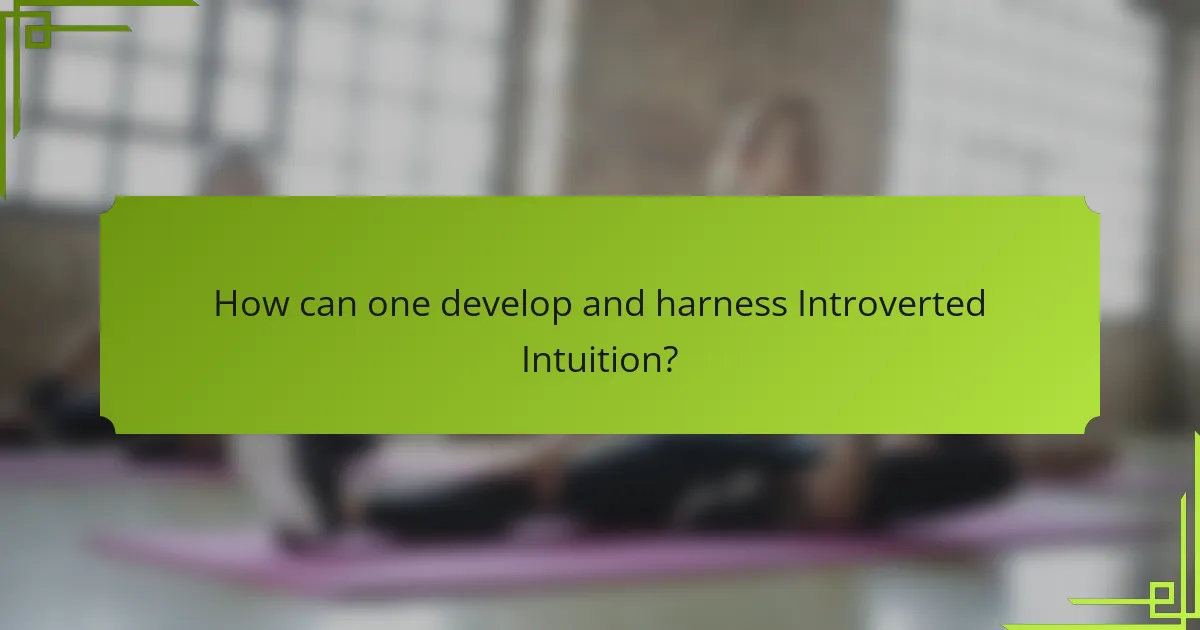
How can one develop and harness Introverted Intuition?
To develop and harness Introverted Intuition, engage in reflective practices and cultivate self-awareness. This cognitive function thrives on internal insights, allowing for deeper understanding in decision-making.
Start by journaling thoughts and feelings to clarify intuitive insights. Regular meditation can enhance focus and foster a connection to inner guidance. Additionally, seek environments that encourage thoughtful reflection, as they can amplify intuitive processing.
Practice active listening in social interactions to better understand underlying motivations. Embrace ambiguity and uncertainty, as these are often where intuitive insights emerge. Lastly, engage in discussions with others who value intuition, as this can provide new perspectives and reinforce your own intuitive abilities.
What practices can enhance Introverted Intuition skills?
To enhance Introverted Intuition skills, practice mindfulness, engage in reflective journaling, and explore diverse perspectives. These practices foster deeper understanding and improve decision-making abilities. Mindfulness sharpens awareness of internal insights, while journaling clarifies thoughts and feelings. Exploring diverse perspectives broadens cognitive frameworks, enriching intuitive insights.
What are the common mistakes to avoid when developing Introverted Intuition?
To develop Introverted Intuition effectively, avoid these common mistakes: neglecting self-reflection, overthinking decisions, dismissing external input, and failing to practice patience. Self-reflection is crucial for understanding intuitive insights. Overthinking can lead to paralysis, hindering decision-making. Dismissing external perspectives limits growth and understanding. Lastly, lack of patience can result in rushed conclusions, undermining the depth of insights gained through intuition.
What expert insights can guide the application of Introverted Intuition in daily life?
Introverted Intuition can enhance daily life by fostering deeper understanding and informed decision-making. It encourages individuals to trust their instincts and insights, leading to more authentic interactions. Practicing mindfulness can strengthen this intuition, allowing for clearer perceptions of situations. Engaging in reflective journaling can also help articulate inner thoughts, providing clarity in social dynamics.
